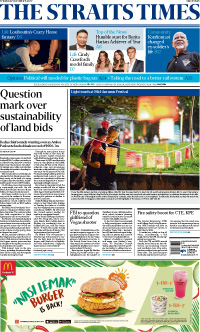Op-Ed: The Straits Times says: Preparing for threat of deglobalisation | Editorial – The Straits Times
.
The upcoming annual parley of the International Monetary Fund and the World Bank Group is not merely an opportunity for, but also places a responsibility on, economic leaders to ponder the fate of globalisation. Countries large and small have a stake in the global outcomes presaged by the ascendancy of regressive or populist thinking. This is also evident in nations that once drew the expanding contours of a liberal economic international order. Britain’s mercantile activism helped chart Asian prospects in the 19th century. A century and two world wars later, America inherited the British mantle and revived Asian fortunes as part of its effort to contain the appeal of communism. Yet, that Anglo-Saxon heritage could come under threat from Brexit and economic nationalism in the United States.
While even larger economies, such as those of China, Japan, India and the European Union, would have to live with the fallout, deglobalisation would badly affect the prospects of smaller economies like Singapore, Hong Kong and Switzerland. Yet, unlike larger countries, which possess more economic space within themselves, small nations can ill afford a closing of the global economic playing field. Questions arise over how they intend to survive in a possibly hostile world.
Here, Singaporeans must worry but not despair. Small economies exposed to the international economy develop, by default if not design, a degree of immunity to its vagaries. They prepare for the worst outside precisely because they cannot be sustained by viable domestic markets. In that spirit, they invest in human capital with protective foresight that might be absent in larger countries. The fear of failure – and hence of disappearance – is built into their national DNA, unlike larger countries, which do not have to contemplate the world without them. The more advanced they are, the better small economies get at fashioning strategies of survival.
Thus it bears repeating that Singapore could do no better than to continue investing in its human infrastructure, which enabled it to leapfrog both its times and its surroundings in the combative 1970s. Strong political and economic institutions which produce both coherence in policy and flexibility in detail are essential for the nation to prepare for a wild global future. Fiscal conservatism and inventive boldness must underpin its foray into the new world of global competitiveness. Its education system must make the young employable in a future where the very notion of paid work will be challenged by automation and artificial intelligence.
The crux is that only a keen degree of suppleness will ensure the economic cunning needed to keep Singapore in the global economic game. The threat of deglobalisation should concentrate minds and energies now, while there still is time.
A version of this article appeared in the print edition of The Straits Times on October 05, 2017, with the headline ‘Preparing for threat of deglobalisation’.
Courtesy: The Straits Times
>
NOTE : All photographs, news, editorials, opinions, information, data, others have been taken from the Internet ..aseanews.net | [email protected] |
For comments, Email to :
D’Equalizer | [email protected] | Contributor









